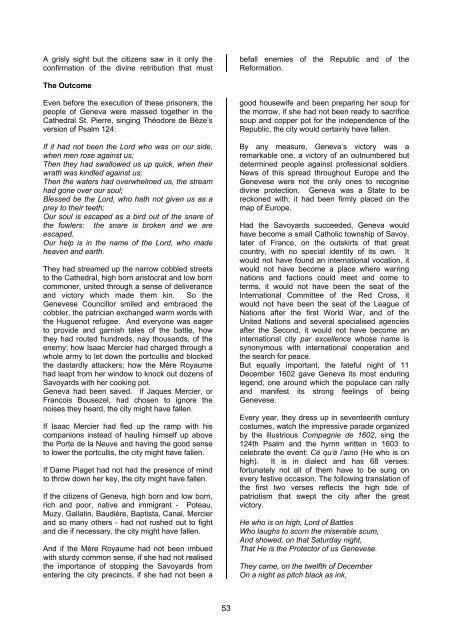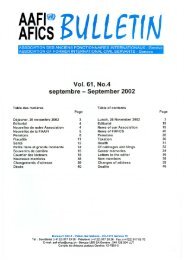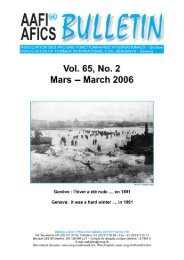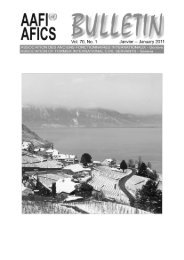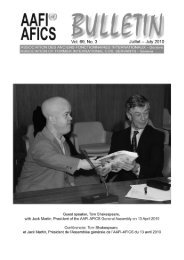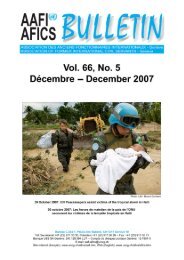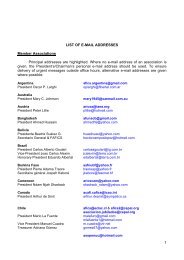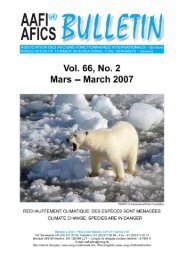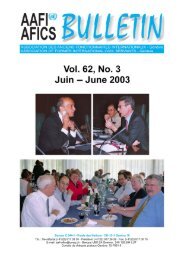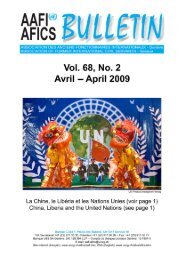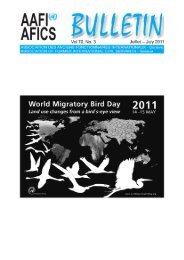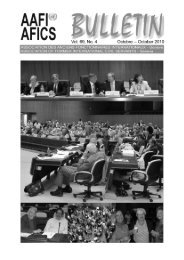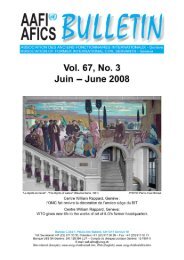nouvelles de notre association - aafi-afics - UNOG
nouvelles de notre association - aafi-afics - UNOG
nouvelles de notre association - aafi-afics - UNOG
You also want an ePaper? Increase the reach of your titles
YUMPU automatically turns print PDFs into web optimized ePapers that Google loves.
A grisly sight but the citizens saw in it only the<br />
confirmation of the divine retribution that must<br />
befall enemies of the Republic and of the<br />
Reformation.<br />
The Outcome<br />
Even before the execution of these prisoners, the<br />
people of Geneva were massed together in the<br />
Cathedral St. Pierre, singing Théodore <strong>de</strong> Bèze’s<br />
version of Psalm 124:<br />
If it had not been the Lord who was on our si<strong>de</strong>,<br />
when men rose against us;<br />
Then they had swallowed us up quick, when their<br />
wrath was kindled against us;<br />
Then the waters had overwhelmed us, the stream<br />
had gone over our soul;<br />
Blessed be the Lord, who hath not given us as a<br />
prey to their teeth;<br />
Our soul is escaped as a bird out of the snare of<br />
the fowlers: the snare is broken and we are<br />
escaped.<br />
Our help is in the name of the Lord, who ma<strong>de</strong><br />
heaven and earth.<br />
They had streamed up the narrow cobbled streets<br />
to the Cathedral, high born aristocrat and low born<br />
commoner, united through a sense of <strong>de</strong>liverance<br />
and victory which ma<strong>de</strong> them kin. So the<br />
Genevese Councillor smiled and embraced the<br />
cobbler, the patrician exchanged warm words with<br />
the Huguenot refugee. And everyone was eager<br />
to provi<strong>de</strong> and garnish tales of the battle, how<br />
they had routed hundreds, nay thousands, of the<br />
enemy; how Isaac Mercier had charged through a<br />
whole army to let down the portcullis and blocked<br />
the dastardly attackers; how the Mère Royaume<br />
had leapt from her window to knock out dozens of<br />
Savoyards with her cooking pot.<br />
Geneva had been saved. If Jaques Mercier, or<br />
Francois Bousezel, had chosen to ignore the<br />
noises they heard, the city might have fallen.<br />
If Isaac Mercier had fled up the ramp with his<br />
companions instead of hauling himself up above<br />
the Porte <strong>de</strong> la Neuve and having the good sense<br />
to lower the portcullis, the city might have fallen.<br />
If Dame Piaget had not had the presence of mind<br />
to throw down her key, the city might have fallen.<br />
If the citizens of Geneva, high born and low born,<br />
rich and poor, native and immigrant - Poteau,<br />
Muzy, Gallatin, Baudière, Baptista, Canal, Mercier<br />
and so many others - had not rushed out to fight<br />
and die if necessary, the city might have fallen.<br />
And if the Mère Royaume had not been imbued<br />
with sturdy common sense, if she had not realised<br />
the importance of stopping the Savoyards from<br />
entering the city precincts, if she had not been a<br />
good housewife and been preparing her soup for<br />
the morrow, if she had not been ready to sacrifice<br />
soup and copper pot for the in<strong>de</strong>pen<strong>de</strong>nce of the<br />
Republic, the city would certainly have fallen.<br />
By any measure, Geneva’s victory was a<br />
remarkable one, a victory of an outnumbered but<br />
<strong>de</strong>termined people against professional soldiers.<br />
News of this spread throughout Europe and the<br />
Genevese were not the only ones to recognise<br />
divine protection. Geneva was a State to be<br />
reckoned with; it had been firmly placed on the<br />
map of Europe.<br />
Had the Savoyards succee<strong>de</strong>d, Geneva would<br />
have become a small Catholic township of Savoy,<br />
later of France, on the outskirts of that great<br />
country, with no special i<strong>de</strong>ntity of its own. It<br />
would not have found an international vocation, it<br />
would not have become a place where warring<br />
nations and factions could meet and come to<br />
terms, it would not have been the seat of the<br />
International Committee of the Red Cross, it<br />
would not have been the seat of the League of<br />
Nations after the first World War, and of the<br />
United Nations and several specialised agencies<br />
after the Second, it would not have become an<br />
international city par excellence whose name is<br />
synonymous with international cooperation and<br />
the search for peace.<br />
But equally important, the fateful night of 11<br />
December 1602 gave Geneva its most enduring<br />
legend, one around which the populace can rally<br />
and manifest its strong feelings of being<br />
Genevese.<br />
Every year, they dress up in seventeenth century<br />
costumes, watch the impressive para<strong>de</strong> organized<br />
by the illustrious Compagnie <strong>de</strong> 1602, sing the<br />
124th Psalm and the hymn written in 1603 to<br />
celebrate the event: Cé qu’é l’aino (He who is on<br />
high). It is in dialect and has 68 verses:<br />
fortunately not all of them have to be sung on<br />
every festive occasion. The following translation of<br />
the first two verses reflects the high ti<strong>de</strong> of<br />
patriotism that swept the city after the great<br />
victory.<br />
He who is on high, Lord of Battles<br />
Who laughs to scorn the miserable scum,<br />
And showed, on that Saturday night,<br />
That He is the Protector of us Genevese.<br />
They came, on the twelfth of December<br />
On a night as pitch black as ink,<br />
53


